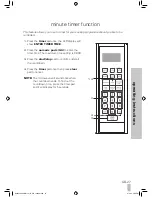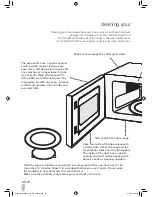
GB-30
troubleshooting
If a problem does occur, it may be due to something very minor. The following Q & A may
be able to resolve the problem.
questions and answers
Q.
Why doesn’t the food seem to cook?
A.
Check that:
• the cooking time has been set
• the door is closed
• the mains socket is not overloaded causing
the fuse to blow.
Q.
Why does the food seem undercooked or
overcooked?
A.
Check that:
• the correct cooking time has been set
• the correct power setting has been used.
Q.
How can I stop eggs from popping?
A.
When you cook or poach eggs in the
microwave, the yolk can sometimes pop as
steam builds up inside it. You can stop the
egg from popping by piercing the yolk with a
toothpick before cooking.
Never cook eggs that are still in their shells.
Q.
Why is it so important that I allow
standing time after cooking?
A.
With microwave cooking, many foods
build up enough heat inside them to continue
cooking even after they have been taken out
of the oven. Microwave cooking works from
the outside of food inwards, standing time
lets you cook the centre of the food just right
without the outside being overcooked.
Q.
Why does my oven sometimes take
longer to cook than it says in the recipe?
A.
First check that the oven was set just as
the recipe said.
Cooking times and heat settings are
suggestions to help prevent overcooking
but differences in the weight, size, shape
and starting temperature of food will all
affect how long it takes to cook – just as it
does with a conventional oven. Use your
judgement along with the recipe to check
whether the food has been cooked properly.
Q.
Why do I get condensation on the inside
of the oven door?
A.
Condensation is perfectly normal,
especially when you are cooking food with a
high moisture content such as potatoes.
Q.
Does the microwave energy get through
the window on the door?
A.
No. The door has a special metal screen
with holes in that lets you see inside but
stops microwave energy from getting out.
Q.
Steam comes out of the side of the door
and vents. Can microwave energy get out
too?
A.
No. The door and vents are carefully
designed to let steam out during cooking but
keep microwave energy in. The gaps are not
big enough for microwave energy to escape.
Kenwood K25MW10_IB_GB_100302.indd 30
3/2/10 3:26 PM



































